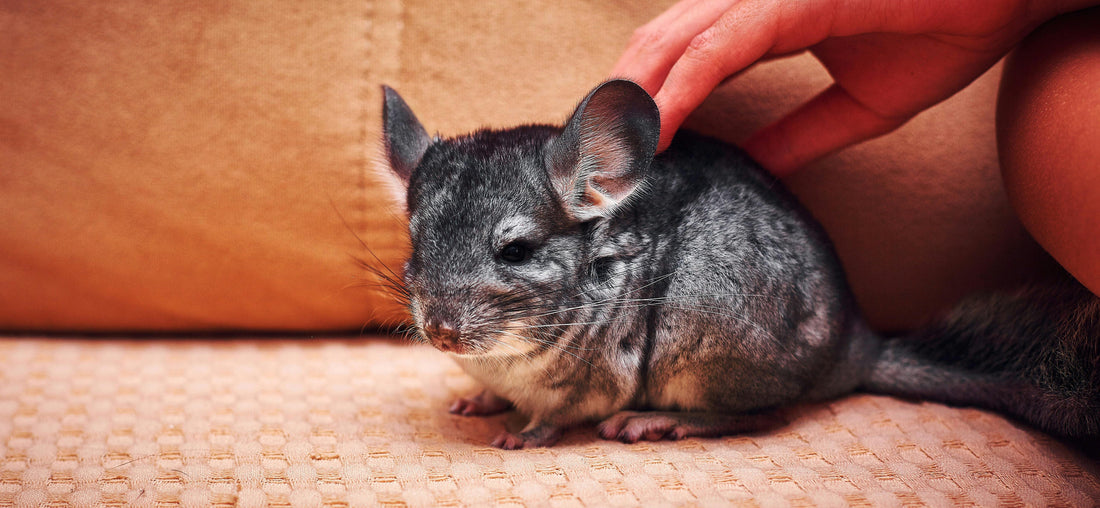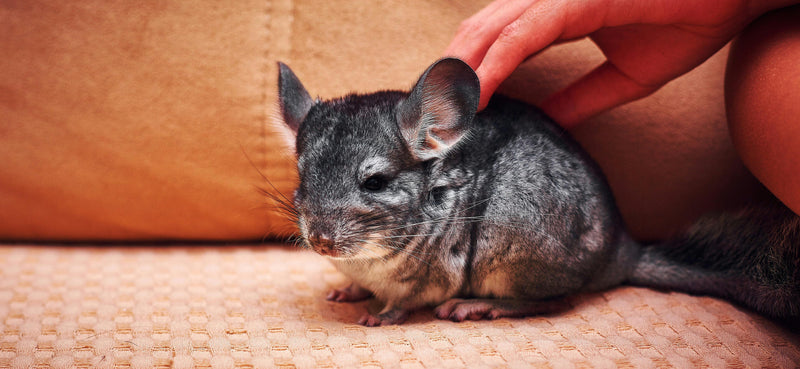Caring for a Chinchilla
With curious personalities and soft, plush fur, (they have the densest fur of all land mammals.) Chinchillas make appealing pets for all ages, though children with chinchillas should be supervised by an adult. Chinchillas sleep most of the day and become active in the evening. Chinchillas are natural acrobats, and some find it hard to sit still; others love to be held and petted. It's best to keep two sam esex chinchillas as companions, as they are very social.
General Care
Chinchillas originally are native to the Andes Mountains and South America at and elevations up to 14,000 ft. Fun Fact: Mt. Whitney CA is 14,505 ft. Avoid sudden movements and loud noises, so your chinchillas will trust you and let you handle them easily. They are naturally inquisitive and may sniff or gently nibble your fingers. Children should always be supervised when holding chinchillas, to prevent accidental falls and injuries. Daily exercise outside the cage, in a chinchilla safe room, is vital to good health. Chinchillas are sensitive to heat, keep their room temp between 60-74 degrees and 40%-60% Humidity. Chinchillas need a Dust Bath in Chinchilla Dust two to four times a week. This keeps their fur soft and clean. Do not bathe them in water.
Housing
Chinchillas need room to exercise, so choose the largest cage you can afford. Avoid those with wire floors, as they can seriously injure chinchillas' feet. Your chinchilla will enjoy a multilevel cage as well as a hideaway house, a large solid surface wheel and a variety of safe wood chew toys. Favorite chews are willow and apple wood sticks. Chinchillas have a sensitive respiratory system so low-dust phenol-free aspen wood bedding is ideal. Cover the floor with a layer of safe bedding. Paper beddings such as Carefresh can be used if the chinchilla is not in direct contact with the bedding. Direct contact can result in dry skin and fur slip (hair loss). Some chinchillas will eat paper bedding or wood shavings, causing potentially life-threatening digestive issues.

Diet
A healthy diet is based on specially formulated chinchilla pellets and good quality timothy or orchard grass hay available at all times. Dark leafy greens such as collard greens, dried treats and alfalfa hay should be given sparingly, 3-4 per week. Fresh water should always be available in a water sipper bottle.
Cleaning
Clean soiled areas daily and change the bedding weekly. Food dishes, water bottles should be cleaned daily and the cage should be scrubbed weekly with a safe small animal cage cleaner. Always rinse and dry the cage well before adding fresh bedding.
Fertility
Male chinchillas become sexually mature at around four months of age. To avoid health risks and unwanted babies, it's important to accurately sex and separate chinchillas no later than four months old.
Health
Be alert and consult an exotics vet if you notice signs of illness or injury such as: lack of appetite, drooling, changes in droppings, bald spots, discharge from eyes or nose, wheezing or noisy breathing.
Warnings
Open-wire exercise wheels can cause serious injuries and should never be used for chinchillas. Avoid pine and cedar shavings, as they contain components that may cause irritation to skin and the respiratory tract.
Companion animals are potential carriers of infectious diseases that can be passed to humans. Taking these simple precautions can help prevent the potential spread of diseases:
- Always wash your hands before and after handling your pet and/or habitat contents
- Carry hand sanitizer when venturing outside of your home with pet
- Do not kiss or let your mouth come into contact with your pet
- Keep your companion’s habitat, water & food bowls, décor, and other surfaces as clean as possible and remove droppings daily
Pregnant women and people with weakened immune systems should speak with their physician when considering a new pet. For more information regarding pets and disease, go to the Center for Disease Control at cdc.gov/healthypets/. The information provided on this Care Sheet is not a substitute for veterinary care. It is strongly advised to seek further information on the care of your animal. In the event of serious health concerns please consult your exotic animal veterinarian.
Recommended Supplies at Your Local Kahoots
- Oxbow Chinchilla Food
- Kahoots Timothy Hay or
- Oxbow Orchard Grass Hay
- KT Aspen Wood Shavings
- KT or Oasis water bottle
- Ceramic food dish
- Kahoots Organic Stain & Odor Remover
- KT Woodland House
- Ware Twig Tunnel
- Oxbow wood chew toys
- Oxbow, KT, and Ware small animal wood chew toys
- Oxbow Orchard Grass Hay
- KT Aspen Wood Shavings
- KT or Oasis water bottle
- Ceramic food dish
- Kahoots Organic Stain & Odor Remover
- KT Woodland House
- Oxbow, Higgins, VL and KT Small Animal Treats
- Oxbow or KT Dust Bath
- KT Chin Chiller- cooling plate
Additional Recommended Supplies
- Large Multi-Level Cage: 4’x4’x3’ min.
- Large 15” Exercise Wheel


